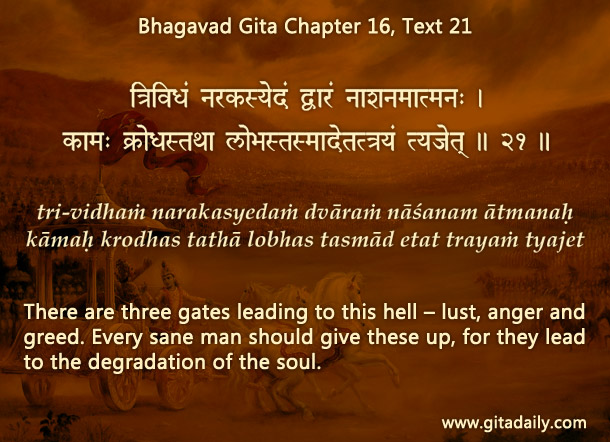Angry about being angry? – We all have probably experienced that anger can make our life hellish, as warned by the Bhagavad-gita (16.21). We may have even resolved to never get angry. But when faced with provocative situations, we may still succumb to anger and lash out at whatever irked us. Later, on realizing that we failed in our resolution, we may again get angry — this time at ourselves for having become angry.
Such anger is an especially insidious attack by anger. To understand why, consider an example. Suppose a boxer resolves to never be knocked down by their opponent. Still, they get punched and knocked down. Thereafter, in a fit of rage, they start punching themselves so forcefully as to render themselves incapable of rising again, leave alone fighting. Similarly ludicrous and disastrous is our anger at ourselves for having become angry; we are letting ourselves become further controlled by the very anger that has overpowered us.
Just because we succumb to the first attack of anger doesn’t mean we have to succumb to its second attack. That second attack, wherein we get consumed by anger about our own anger, renders us incapable of restraining our anger, leave alone rectifying the issue that provoked our anger.
How can we avoid compounding our anger? By acknowledging that anger is a formidable foe and readying ourselves to take a few falls without over-reacting.
Gita wisdom increases our inner resilience by reminding us that we are at our core indestructible spiritual beings who can’t be affected by anger. By regular spiritual practices, we can firmly situate ourselves in our spiritual identity, thereby observing the attacks of anger more objectively and dealing with them more effectively.
One-sentence summary:
Even if anger can’t be controlled, it needn’t be compounded — don’t become angry because you have become angry.
Think it over:
- What’s wrong with becoming angry at ourselves for having become angry?
- How can we avoid compounding our anger?
- Do you sometimes compound your anger? How can you become a better observer and restrainer of such anger?
***
16.21: There are three gates leading to this hell – lust, anger and greed. Every sane man should give these up, for they lead to the degradation of the soul.
***
16.21: There are three gates leading to this hell – lust, anger and greed. Every sane man should give these up, for they lead to the degradation of the soul.
To know more about this verse, please click on the image


Hungry man is always angry man
Yes, that’s one potentially preventable cause of anger.
What’s wrong with becoming angry at ourselves for having become angry?
Second attack of anger makes us incapable of restraining our anger. Moves us away from dealing and resolving the real issue which provoked us to become angry in first place.
How can we avoid compounding our anger?
By acknowledging that anger is a formidable foe and readying ourselves to take a few falls without over-reacting.
Do you sometimes compound your anger? How can you become a better observer and restrainer of such anger?
Yes, I use to. But as I became more conscious and serious about pleasing Krishna, second attack of anger on me started losing it’s control. Infact just in recent incident, I told myself I don’t have to become angry about getting angry. I didn’t let my anger to attack me for second time. I accepted my emotion of anger. Dealt the issues that caused me to become angry in first place.
Below points helped me to become better observer and restrainer of my anger
1.By observing that anger doesn’t generally serve any purpose. Most of times it only makes things worse.
2.By understanding and becoming more and more aware of the fact that anger is not favorable to spiritual life.
3.I have observed that when I am in mode of goodness I am able to observe and see things for what they are. So I pray and endeavor to rise from mode of passion and ignorance and situate myself in to mode of goodness through spiritual practice and through association of those devotees who have conquered anger.
Thanks for sharing your answers. Candid and clearly articulated.
Thank you for encouragement prabhu.